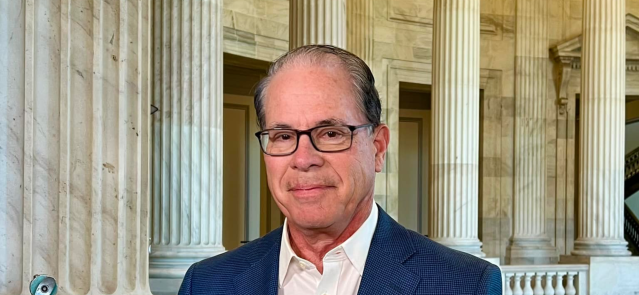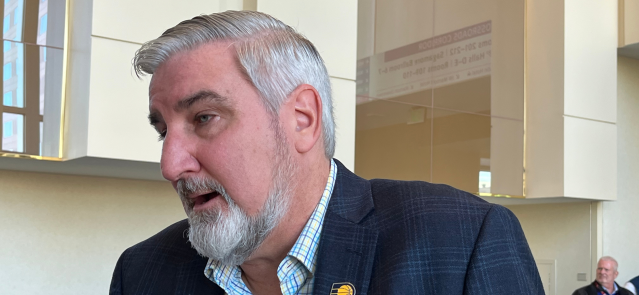Stay ahead of the curve as a political insider with deep policy analysis, daily briefings and policy-shaping tools.
Request a Demo‘Our system was literally broken’: How Indiana lawmakers hope to fix overcrowded jails and mental health treatment
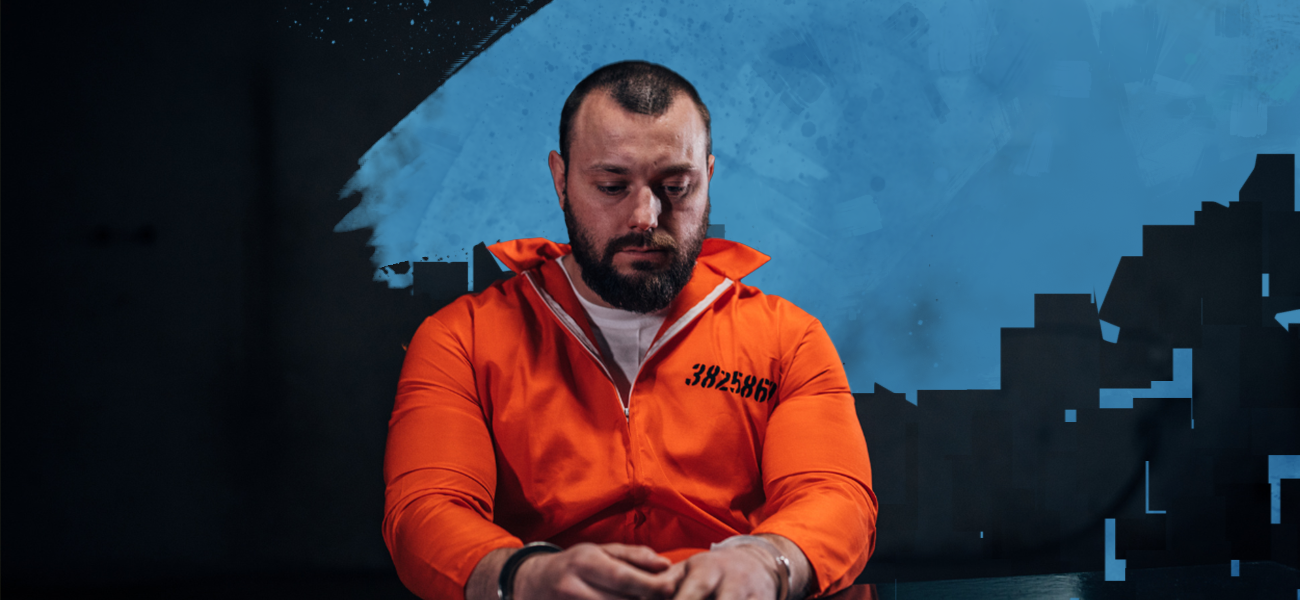
The Gist
State Rep. Greg Steuerwald, R-Avon, has garnered bipartisan, widespread support for a bill that aims to ensure Hoosiers receive mental health treatment in medical settings instead of inside their local county jails.
What’s Happening
The majority of Indiana’s jails have been overcrowded for years because they have become the de facto mental health facilities in most counties.
When law enforcement officers encounter someone experiencing a mental health crisis, they typically have two options: bring them to the emergency room or take them to jail.
In addition, sheriffs are seeing a big spike of people being held because they were arrested on non-violent, low-level crimes that were driven by their addiction or other mental health issues. Drunken driving, possession of a drug or syringe and drug dealing are common examples.
Taken together, jail overcrowding can lead to poor health outcomes for incarcerated Hoosiers, but especially so for ones who have a mental illness. It’s also costly for county budgets because of how expensive it is to keep someone locked up and to pay for their health care. That’s money that could otherwise support other local government services, such as roads or parks.
“Our system was literally broken,” said Steve Luce, a former sheriff who is now executive director of the Indiana Sheriffs' Association. “The jail is not set up to take care of these individuals. It’s for pretrial individuals. Our facilities cannot handle these types of individuals over time.”
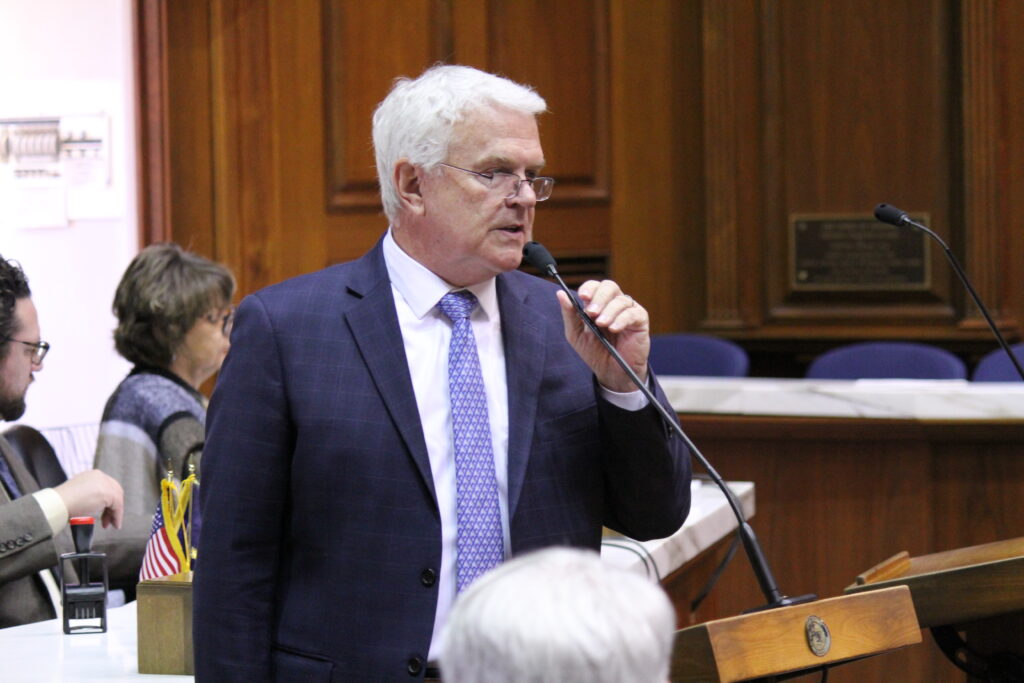
Steuerwald began working on a new bill in January 2022 to address the problems. That’s when he started meeting with Gov. Eric Holcomb's office and Indiana Supreme Court Justice Christopher M. Goff.
He also convened representatives from all corners of the criminal justice and health care systems, which resulted in support from groups that are often opposed to each other in the courtroom. Associations representing judges, public defenders, prosecutors, police officers and sheriffs testified in support during a House committee last week.
House Republican leadership introduced Steuerwald’s bill — House Bill 1006 — at the start of the current legislative session as one of their priority bills.
Why It Matters
Roughly 20,000 people are held inside Indiana's county jails on any given day, according to data contained within state inspection records. The population turns over quickly because jails are primarily temporary holding facilities, so the number of Hoosiers who end up behind bars each year is even higher.
If only a handful of counties were struggling to keep up with crowding and health care concerns, perhaps the state would not intervene.
One in five Hoosiers, though, experience a mental health issue each year, according to the state’s Behavioral Health Commission.
And jail overcrowding is widespread — with at least 70% of the people in Indiana's jails believed to have a mental illness or addiction, according to estimates by Indiana sheriffs.
Many simply need access to drug treatment and medicine, such as buprenorphine or methadone, which are used to treat opioid addiction. Even then, a great burden is placed on sheriffs who run the jails. They are tasked with finding medical providers and, in some cases, clearing space for health care and programming inside cramped, aging jails that weren’t designed for either. The alternative is another expensive proposition: asking local taxpayers to build bigger jails.
Additionally, a smaller but not insignificant number of people in jail have been diagnosed with a severe mental illness.
“With those individuals, they obviously require so much more one-on-one when you're taking care of them in the jail because they're susceptible to being taken advantage of and they have so many requirements,” Steuerwald told State Affairs. “It just takes an inordinate amount of resources in a jail setting.”
Resources — particularly staffing — are already hard to come by inside many jails. Staffing shortages are exacerbating other challenges around mental health and addiction.
And then when counties fail to provide the necessary resources, the outcomes can be devastating.
A yearslong IndyStar investigation in 2021, for example, found that Hoosiers were dying inside county jails on average every two weeks over more than 10 years. Not all of those deaths were the result of gaps in mental health treatment, but many were. The leading cause of death was suicide, IndyStar found, which amounted to 42% of the deaths. Three in four of those deaths occurred in jails that were flagged by state inspectors as overcrowded, understaffed or both.
And at least 19% of the deaths were directly tied to substance use, including overdoses.
What’s the Legislation?
One of House Bill 1006’s priorities is focused on mental health referrals for people who are in jail.
The bill would enable sheriffs, prosecutors and defense attorneys to petition the court to request a mental health assessment on someone who has been booked into jail.
After an assessment, a judge could refer a defendant to a mental health provider as a condition of release prior to a trial or plea agreement. The goal is for people to receive the treatment they need and for counties to absorb fewer costs associated with the burdens of overcrowded jails.
And if the defendant is accused of committing a violent crime, the services would occur inside a secure facility, such as ones operated by the Department of Correction or the Division of Mental Health and Addiction.
“We wanted to make sure they got treated but in a secure environment,” Steuerwald said. “We've made provisions for anybody with a mental illness to be treated.”
Nothing in the bill would interrupt the prosecution of a case, but Steuerwald said he expected someone’s mental health treatment would be factored into any considerations about plea agreements.
Just as importantly, counties would not be on the hook for paying the costs of mental health assessments. The state budget would pick up that tab, enabling smaller and rural counties to participate.
Asked if he’s faced any pushback from his colleagues in the House or Senate, Steuerwald told State Affairs: “None.”
“I've had full support from the speaker and Ways and Means from the very beginning of the process," he said. "When I said the sheriffs are making this request and it's long overdue that we help them, everybody has been supportive and said, 'Go ahead.’”
It’s unclear how much money is expected to be saved in local budgets or added to the state budget; the legislation does not specify, and neither the Indiana Sheriffs’ Association nor the Association of Indiana Counties were aware of those numbers.
State Rep. Jeff Thompson, the House budget writer, told State Affairs that he could not immediately recall the exact costs but did not anticipate any concerns over the amount.
The bill has a second priority clarifying language around immediate and emergency detentions, which are the processes used to detain someone against their will. For example, a law enforcement officer may use an immediate detention to bring someone threatening suicide into a medical facility.
The bill also would ensure that hospitals receive payment for detentions by noting in the law that the treatments are medically necessary. Right now, Steuerwald said, hospitals aren’t always being paid for the care.
Receiving Treatment
Even some supporters of the bill acknowledged one limitation, though.
Many Hoosiers lack adequate access to care for mental health and addiction. It’s particularly acute in rural areas, where treatment beds and providers have been scarce for years — for people both inside and outside of jail.

State Rep. Matt Pierce, D-Bloomington, voted for the bill but raised that concern.
"What I've been hearing for the last 10 years since we did criminal code reform is prosecutors and sheriffs saying, ‘I really wish I could put these people somewhere else where they could actually get their mental health or substance abuse disorders treated, but I just don't have anything around here,’” Pierce told State Affairs. “And then we complain about the jails being overcrowded.”
Pierce wants to see the General Assembly help fund an expansion of treatment for mental health and drug addiction.
Jay Chaudhary, director of the state's Division of Mental Health and Addiction, spoke to Pierce’s concerns during a House committee meeting last week.
“Do we have capacity right now to handle this? I don't think so,” Chaudhary said. “If we wait until we have capacity to tackle these issues, we'll just be waiting forever.”
What’s Next?
The bill is also supported by the Indiana Council of Community Mental Health Centers; Mental Health America of Indiana; the Coalition of Advanced Practice Nurses; and the Indiana Hospital Association.
It received unanimous support in the House on Tuesday with a 99-0 vote. It next heads to the Senate for consideration. Steuerwald said senators Freeman, Crider and Koch are sponsoring it.
Have questions or comments about the upcoming legislative session? Contact Ryan Martin on Twitter, LinkedIn, Facebook or at [email protected].)
Twitter @stateaffairsin
Facebook @stateaffairsin
Instagram @stateaffairsin
LinkedIn @stateaffairs
Header image: Indiana lawmakers hope to fix overcrowded jails and mental health treatment. (Credit: Brittney Phan)
Read this story for free.
Create AccountRead this story for free
By submitting your information, you agree to the Terms of Service and acknowledge our Privacy Policy.
Brad Chambers sells himself as ‘business guy’ to lead Indiana
EDITOR’S NOTE: This is one in a series of profiles of the candidates running for Indiana governor.
Brad Chambers argues big ideas and actions are needed in the coming years to propel Indiana and its economy forward.
Chambers has already put $9.6 million of his own money toward that argument as he tries to transform himself from a successful real estate developer who was virtually unknown by the general public into the Republican nominee for governor.
The first steps for his entry into the governor’s race came during his time as Gov. Eric Holcomb’s state commerce secretary and leading the Indiana Economic Development Corp. — the agency tasked with attracting business growth to the state.
A big idea from Chambers’ time with the IEDC was the LEAP Lebanon Innovation District, a planned 9,000-acre hub for tech-related industries that has been a target of criticism from the other five Republican candidates in the May primary.
Chambers remains steadfast in defending the project as a needed asset to compete with other states for major projects and asserts Indiana needs more of that kind of leadership.
“What I bring to this race is I’m not making decisions — and LEAP is proof — I’m not making decisions on three-year election cycles because I’m not an elected official,” Chambers said during an interview with State Affairs. “I’m making decisions like a business guy — which is, ‘What’s good for Indiana?’ — no matter if I’m around to see it come to fruition or not.”
Path to business success
Chambers, 59, grew up in Indianapolis as a son of prominent businessman William Chambers, who participated in numerous civic organizations and was the finance chairman for Republican Dan Burton’s 1982 election to the first of his 15 U.S. House terms, according to the elder Chambers’ 1997 Indianapolis Star obituary.
Brad Chambers traces his business career back to a lawn mowing service he started with some friends while a Lawrence Central High School student.
He said he was using his share of the profits to pay his Indiana University tuition before one of the friends bought him out a few years later for $5,000. It became the seed money to purchase a repossessed house in Indianapolis as a rental property.

“I like to say it was divine intervention that I didn’t blow it,” Chambers said of the lawn service buyout.
That first property sparked his interest in the real estate business.
“I’m like, this is kind of fun, and so I ended up rooting around and by the time I graduated from IU, I had 31 rental units,” he said.
Those rentals were the start of Buckingham Companies, the development business Chambers founded. It now claims a portfolio of $3 billion in a variety of apartment, retail, hotel and business projects with more than 400 employees in nine states.
Buckingham’s prominent Indianapolis work includes the CityWay development, which has apartments, retail sites and the upscale Alexander hotel near Gainbridge Fieldhouse.
Chambers said he stepped away from day-to-day company leadership when Holcomb selected him in 2021 as state commerce secretary, a post he held for $1 a year before resigning last August to launch his gubernatorial campaign.
The breadth of Chambers’ business is represented in his candidate financial disclosure statement, which lists ownership of 63 properties in nine states and stakes in 279 real estate or other partnerships. He said he would keep his business interests separate from state actions if he became governor.
“Indiana is obviously important, but we’re a national company, we’re doing business all over the country,” Chambers said. “We understand the rules of the road there and our guys are running the business and they’re doing a great job.”
Road to the governor’s race
Holcomb recruited Chambers to the state commerce secretary job in 2021 after the position had been vacant for about four months.
Chambers said that about a year later, others began raising the idea of him running for governor in 2024 since Holcomb couldn’t seek reelection because of term limits.
“I never really gave it too much thought until [2023,] probably second quarter of ’23, and then started thinking about it in earnest,” Chambers said. “I’m not a politician. I’ve never run for [anything]. I didn’t know anything about it. So I had to understand it and then started doing what business guys do, which is evaluate, and it was a tough decision.”
Republican Fishers Mayor Scott Fadness said he got to know Chambers after he started leading the state’s economic development agency.
Fadness, who has been mayor of the Indianapolis suburb since 2015, said he quickly became impressed with Chambers’ willingness to talk in depth about big ideas.
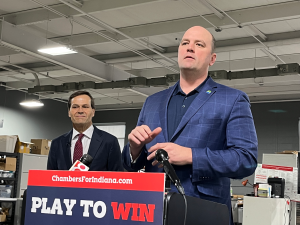
Those conversations grew to include discussions about whether Chambers should run for governor, although Fadness said he largely explained the hurdles Chambers would face with his campaign.
“He could be living a very good life, doing a variety of other things,” Fadness told State Affairs. “I think he just felt compelled to run because he wants to move Indiana forward. That kind of leadership and that kind of motivation is a rarity in politics anymore, and I guess that’s what kind of made me gravitate towards him.”
Many prominent Indiana business leaders have joined in supporting the Chambers campaign. Among those making sizable contributions are Eli Lilly and Co. CEO David Ricks ($100,000), Kittle Property Group CEO Jeffrey Kittle ($100,000), Indiana Pacers owner Herbert Simon ($50,000) and retired Lilly CEO and IEDC board member John Lechleiter ($50,000).
Chambers has been willing to sink own money — $9.6 million as of mid-April — into the campaign for his message that he’s “a business guy” focused on growing the state’s economy.
“That story resonates, but it’s six and a half million people to communicate with,” Chambers said of Indiana’s voting-age population. “It takes time and it takes resources.”
Critic calls LEAP District planning ‘underhanded’
Indianapolis-based Lilly was the first company making a major commitment to the LEAP District, with a $3.7 billion research and manufacturing campus now under construction.
Chambers points to the district as a major step toward making Indiana competitive with other states for major projects. He argues that Indiana lost out on perhaps landing a $20 billion Intel microchip plant to the Columbus, Ohio, area because it didn’t have a ready-to-build site available.
Chambers’ critics argue the LEAP District is an example of “top-down leadership” at the Indiana Economic Development Corp. that disregards the concerns of local residents and officials.
Project opponent Brian Daggy, a retired Boone County farmer, said Chambers hasn’t tried to engage with those whose homes would be affected by the LEAP District transforming what is now largely farmland into manufacturing and research facilities.
Daggy and his wife bought a house in the northern part of the district as their retirement spot a few months before finding out in late 2021 about the IEDC buying up land for the project. Daggy has turned down purchase offers and helped organize the Boone County Preservation Group, of which he’s now president.
Daggy said he understands wanting to see government operate more efficiently and business-like but that the IEDC under Chambers showed a disregard for the residents’ concerns.
“He has given all indication that he knows what’s best, and that’s what he’s gonna carry forward,” Daggy said. “It causes me concern, a lot of pause, thinking about that he would run the state in that kind of a manner.”
A proposed 35-mile pipeline to transport water from a Wabash River aquifer near Lafayette to the LEAP District has drawn opposition from the Tippecanoe County area over concerns such as a loss of irrigation for farmers and worries about environmental damage from pumping out potentially tens of millions of gallons of water a day.
Residents in the Lafayette area didn’t know the pumping tests were being carried out for the proposed pipeline last year until they suddenly didn’t have water from their wells or noticed sulfur odors from their water they had never smelled before, said Sandra Alvillar, president of the group Stop the Water Steal.
Chambers, Holcomb and Republican legislative leaders have said no work on building the pipeline will go ahead unless an ongoing aquifer study shows adequate supply.
Alvillar, however, called the IEDC’s planning for the pipeline “underhanded” and said Chambers and the agency have been focused on a public relations response rather than listening to local concerns.
“If they have not been transparent up to this point, once they’re safe in their little office, it’s not going to get better,” Alvillar said.
Chambers has kept his focus on the economy
Chambers has focused his bid for governor on economic issues and running a decidedly non-Trump-like campaign. He has largely avoided hot-button culture issues, pointing in his TV ads and public remarks to former Gov. Mitch Daniels, who had a similar emphasis while in office, as a leader he would emulate.

Chambers has touted his “Play to Win” plan as aiming to boost business growth in the state through steps such as more infrastructure investment and increased support for small businesses and entrepreneurs.
“The one thing that I know touches every Hoosier, not some Hooiers, is financial security and opportunity,” Chambers said. “Fundamental to quality of life is good education and public safety, and you can’t fix those or invest in those without a growing economy. I believe when people have financial security, their health is better, their kids are better, their housing is better and overall quality of life is better. So I’m just focused on the one topic where I have had some experience.”
Chambers remains an underdog in the governor’s race, as a State Affairs/Howey Politics Indiana poll in early April found U.S. Sen. Mike Braun with support from 44% of likely Republican primary voters.
Chambers, Lt. Gov. Suzanne Crouch and Eric Doden each received about 10% support — and roughly 6 in 10 respondents were unfamiliar with Chambers despite the millions of dollars he’s spent statewide on TV ads.
Fadness, the Fishers mayor, said he believed Chambers would bring a needed sense of urgency and decisiveness to the governor’s office and hoped Chambers’ focus on the state’s economy would still catch on with voters.
“Those may not be the talking points that garner the most attention from people or get the headlines, but those are the things that are going to decide the trajectory of our state for many years to come,” Fadness said. “I think they’re vitally important. But I also am, I guess, a realist in that I understand that those aren’t always what folks spend their time and attention on in a political race.”
about Chambers
- Age: 59
- Hometown: Indianapolis
- Education: Bachelor’s degree in finance from Indiana University
- Family: Married to Carol with an adult son, Nick
- Job: CEO of real estate development firm Buckingham Companies since founding it as a college student in 1984
- Work history: Indiana secretary of commerce under Gov. Eric Holcomb, 2021-23; previously chairman of the Indiana State Fair Commission
Read these related stories
- Eric Doden is running from behind but hopes his ‘bold vision’ will propel him forward
- Suzanne Crouch positions herself as a ‘different’ candidate for the voiceless
- Mike Braun on why he wants to be in politics ‘at a level of significance’
- Who is Jamie Reitenour? Indianapolis mom mobilized volunteers to make governor’s ballot
Tom Davies is a Statehouse reporter for State Affairs Pro Indiana. Reach him at [email protected] or on X at @TomDaviesIND.
X @StateAffairsIN
Facebook @stateaffairsin
Instagram @stateaffairsin
LinkedIn @stateaffairspro
Final Republican governor debate focuses on economics, abortion
INDIANAPOLIS — Five hopefuls vying for the chance to be Indiana’s next governor took each other to task — and at times fought the questions themselves — on economic development, social issues, election integrity and more during Tuesday’s Republican gubernatorial debate hosted at Indiana University-Purdue University Indianapolis.
The debate, the last of the primary cycle and sponsored by the Indiana Debate Commission, at times spiraled into revolt, as candidates disagreed with moderator Jon Schwantes’ yes-no questions on election integrity and immigration. In other moments, the candidates stuck to their various platforms on taxes, education and beyond.
Former state Secretary of Commerce Brad Chambers, Lt. Gov. Suzanne Crouch, Fort Wayne businessman Eric Doden, former state Attorney General Curtis Hill and Indianapolis mom Jamie Reitenour participated.
Sen. Mike Braun, who has thus far led the crowded field in the polls, informed the Debate Commission on Monday that he would not attend the debate. He returned to Washington, D.C., where he cast one of 19 dissenting votes against a $95 billion aid package for Ukraine, Israel and Taiwan. The bill passed the Senate on a 80-19 vote.
Braun’s rivals targeted him several times in his absence, but the five candidates on stage mostly focused on one another throughout the debate. Gov. Eric Holcomb, a frequent target in previous debates, was hardly mentioned.
Schwantes, host of the WFYI-FM series “Indiana Lawmakers,” read from a slate of questions submitted in part by state voters and selected by the Debate Commission.
Election integrity
The night’s first major clash occurred during yes-no questioning on the safety and authenticity of the country’s elections.
Each candidate except Reitenour said they were confident in Indiana’s election integrity. All acknowledged the 2020 election was not stolen.
Asked if Joe Biden was the duly elected president, Hill and Reitenour pushed back, saying “anomalies” were not properly investigated.
The candidates essentially refused to answer a question asking if they would accept the 2024 election results, saying it was too hypothetical.
Agreement on abortion
Several questions were asked about abortion, though the candidates largely agreed on the issue.
The group was asked whether the state’s current abortion ban, which includes exceptions for rape, maternal health and other limited circumstances, was sufficient.
Chambers, Doden and Crouch agreed it was.
Hill called for increased enforcement of the ban, saying the state’s health department is not providing the necessary reports for terminated pregnancies.
“I brought 2,411 unborn babies from Illinois to have them buried in Indiana to establish their humanity,” Hill said, referencing a 2020 action he took as attorney general.
Reitenour did not answer the question directly, saying only that “we need to be a state that says we are for life.”
The group refused to answer when Schwantes asked if they agreed with the Indiana Supreme Court, which he said found the maternal health exception to be necessary under state law.
The candidates also agreed on in vitro fertilization, saying it should be allowed in Indiana. Some conservative states have targeted the procedure as part of the abortion debate.
Return to the IEDC
The Indiana Economic Development Corp. (IEDC), and particularly its LEAP Innovation District project seeking to build a ready-made space for business in Lebanon, Indiana, was a return topic from past debates. Chambers and Doden previously led the organization, and Chambers rose in defense of the LEAP District.
Reitenour called the project “putting a whale of a company in the middle of the desert with no water.”
Doden also directly criticized it, saying the IEDC existed only to help businesses navigate government rules.
Hill called the IEDC “a shadow government” that needed to be “reined in.”
Crouch used the question to launch into her plan to get rid of the state’s income tax.
“It’s a terrific contrast between career politicians and small thinking,” Chambers said in response to the criticisms.
Chambers goes after Crouch
Crouch was asked whether it made financial sense to cut the income tax, which brings in billions in state revenue each year.
Chambers seized on the topic.
“It’s a political talking point if ever there was one,” he said. “She has not told us how much she’s going to have to cut education, public safety, police, mental health or health care.”
Crouch doubled down, noting the income tax is already phasing down to below 3% in the coming years.
“Let’s just keep going in that direction when we have excess surplus in revenues,” she said.
Differing education approaches
A question about improving Indiana schoolchildren’s test scores led to a contrast in policy approach.
Doden and Crouch focused on school choice and workplace development.
Chambers said students require individualized learning opportunities.
Reitenour railed against critical race theory and social-emotional learning, saying kindergarten through fifth grade students need more focus on educational fundamentals.
Hill urged schools to stop taking federal money that requires certain programs, which Crouch joined in supporting.
Closing statements
Candidates were allowed to summarize their candidacy in final closing statements.
Chambers focused on his economic plan, likening his hopes for the state to his career as a businessman.
“We believe it’s time for a CEO, someone to run [the state] like a business,” Chambers said.
Hill leaned into social issues, railing against abortion and claiming “there are only two genders.”
“Don’t let politicians give you a laundry list of conservative talking points and say that’s enough,” Hill said. “Prove you can do the job.”
Doden focused on his platform talking points: restoring small towns, growing the economy and expanding zero-cost adoption.
“We have more plans in writing than everyone on this stage combined,” Doden said.
Crouch returned to her key proposal, which would eliminate the state’s income tax.
“My opponents say it’s a gimmick, but what they’re really saying is the government needs more of your money and you need less of it,” Crouch said.
Reitenour said God called her to run and cast doubt on Indiana’s conservative reputation.
“We live in a state that says it’s a red state and believes in conservative values, and yet I am trying to figure out where the conservatives are in government,” she said.
Read this related story
Contact Rory Appleton on X at @roryehappleton or email him at [email protected].
And subscribe to State Affairs so you do not miss an update.
Facebook @stateaffairsin
Instagram @stateaffairsin
LinkedIn @stateaffairs
Republican rivals knock Mike Braun for missing final governor debate
U.S. Sen. Mike Braun faced criticism from other Republican candidates for governor over missing their final televised debate because of scheduled Senate votes Tuesday on providing military assistance to Ukraine, Israel and Taiwan.
Tuesday evening’s 90-minute debate will go on as scheduled with the remaining five Republican candidates still expected to participate, according to the Indiana Debate Commission, the nonprofit group organizing the matchup.
“Braun’s campaign team notified the commission late Monday that he must be in Washington, D.C., for a vote,” the commission said in a statement.
A Senate vote on the military aid package wasn’t expected until at least Tuesday night.
Braun issued a statement casting blame on Democratic Senate Majority Leader Chuck Schumer for scheduling the vote three days after the Republican-led House approved the bill.
“I was looking forward to sharing my vision with Hoosiers at tonight’s debate but Chuck Schumer has called the Senate into session,” Braun’s statement said. “Tonight, I am in D.C. voting ‘no’ on a bill to send $95 billion of your money overseas instead of securing our open southern border, which puts Hoosier families in danger every day. I’m proud to stand up for you and vote against the Biden spending spree making life unaffordable for so many Hoosiers.”
The Brad Chambers campaign contrasted Braun’s potentially skipping the debate to vote on the military aid package to his missing last month’s Senate vote on a $1.2 trillion spending package avoiding a government shutdown several hours after attending an Indiana campaign fundraising event.
“Career politician U.S. Senator Mike Braun continues to insult Hoosiers and put himself first,” Marty Obst, senior strategist for Chambers, said in a statement. “He’ll skip votes in D.C. to collect checks at a campaign fundraiser but then use votes to skip a debate and hide from voters and his record.”
Braun’s campaign said he returned to his home in Jasper following a Friday-evening fundraising event and planned a return to Washington the next day for the Senate vote. But his campaign said the vote was unexpectedly held at nearly 2 a.m. that Saturday — and that Braun would have voted against the government funding bill that passed 74-24.
Tuesday’s debate is scheduled for 7-8:30 p.m. before an audience at Hine Hall Auditorium on the Indiana University-Purdue University Indianapolis campus. It will be televised by several PBS stations across the state and streamed on the commission’s website, indianadebatecommission.com.
Braun had support from 44% of likely Republican primary voters in a State Affairs/Howey Politics Indiana poll conducted in early April. Lt. Gov. Suzanne Crouch, Eric Doden and Chambers each received about 10% support.
Crouch campaign manager Liz Dessauer said in a statement that “Braun skipped a key budget vote to attend a campaign fundraiser, but now suddenly realizes he needs to do his job in order to skip the last debate?”
Long-shot candidate Jamie Reitenour, who is among those taking part in Tuesday’s debate, also knocked Braun for missing the debate for a Senate vote while not missing last month’s government funding vote.
“He’s trusting that his $7M campaign spending will trump his disrespect for the voter!” Reitenour posted on X.
Update: This story was updated to include a statement from Braun explaining his absence from the debate.
Tom Davies is a Statehouse reporter for State Affairs Pro Indiana. Reach him at [email protected] or on X at @TomDaviesIND.
X @StateAffairsIN
Facebook @stateaffairsin
Instagram @stateaffairsin
LinkedIn @stateaffairspro
Holcomb says he’s confident of investments from Brazil, Mexico trip
Gov. Eric Holcomb wrapped up his weeklong travels to Brazil and Mexico by saying he expected new business investments to emerge from the trip. Holcomb told reporters Thursday night from Mexico City that he had many productive meetings with government and business leaders promoting Indiana’s agriculture ventures. “It really does remind me that face to …



